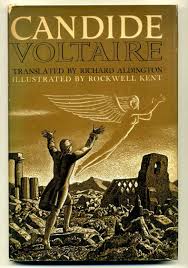Candide – Voltaire – 1759
Reviewed by: Guillermo Maynez Date: 5 August 2004
The problem posed by Voltaire in this gem of a little book is common to practically all modern religions (insofar as religions are modern): God is almighty (OK) God is all-loving (OK) SO, why the hell is there evil in the world???
I made myself this question when I was a little kid being grown up as a Catholic in Catholic schools. If God loves us all, what is that street kid doing all poor and sad and deserted by everybody? Why do people have to suffer so much? Then people would say “You don’t understand (no kidding), God is putting us through a test of faith and love blablabla”.
The thing has remained unresolved, at least for me, and I love this book in which Voltaire makes a lot of fun of Leibniz – Pangloss and the idea that this is the best possible world because if not then the world would be different. Well this world has wonderful things but in the end it’s a fraud.
Voltaire takes us on a tour of the world to check out all things that can and do turn out wrong and tragic. The final phrase is a classic. “Let each one tend his own garden”.

Reviewed by: Turhan Uludag Date: 22 April 2004
In Candide, among many things, what is emphasized is that there was a possibility that the world human beings inhabit could have been created differently and that it could also have been created by omitting evil which then can it be called the “best of all the possible worlds”? The character named Pangloss in the story Candide illustrates his views on the nature of things:
“It is proved” he [Pangloss] used to say, “that things cannot be other then they are, for since everything was made for a purpose, it follows that everything is made for the best purpose”. (Candide, 20)
There are problems with the above argument. First, it does not evidence how everything is made for the best purpose. Second, it is problematic also because things could have been otherwise because the creator was free (we assume) to choose a world where he could have made it different. To exemplify, in Candide, terrible things happen; people die from wars, earthquakes, murder etc and that if God is [or was] omniscient, he knew beforehand the fate of every human being. If he allows evil to accompany good in the world, then he is not all loving or omnipotent.















